Tuesday, April 01, 2025
Wednesday, September 18, 2024
Osage Orange Tree
 |
| The ball looking thing is the Osage orange tree fruit. |
 |
| A little closer shot. |
- Appearance: It is a medium-sized deciduous tree, typically growing 30-50 feet tall. The tree has a short trunk, dense, round crown, and stout thorns. Its leaves are dark green, shiny on the upper surface, and paler with some hairs along the veins on the lower surface.
- Fruit: The tree produces distinctive, large, spherical, bumpy fruits that are bright yellow-green and about 3-6 inches in diameter. Despite its name, the fruit is not related to oranges and is generally not eaten by humans.
- Uses: Historically, the wood was highly valued by Native Americans for making bows, hence the name “Bois d’Arc” (bow-wood) in French. The tree was also used as a natural fence before the invention of barbed wire due to its dense, thorny growth.
- Modern Uses: Today, the Osage orange is often used as a windbreak and for erosion control. Its wood is still prized for its durability and resistance to decay.
- Ecological Role: The tree is considered a pioneering species, often invading exposed soils and overgrazed pastures. It can become locally dominant in such environments.
Thursday, August 15, 2024
Happiness - Day 15
Friday, August 09, 2024
Happiness - Day 9
Today I am happy because we had rain. We did not have flooding rain, at least not here (some of the neighboring communities did), but we had the rain we needed that hopefully will bring back the pastures and maybe give us some hay for the cattle.
The drought isn't over, but it helped put a little dent in it. We were starting to really worry.
______________________
Monday, June 17, 2024
Not the Uber Driver
This year, we are making hay on someone else's property, which means driving equipment six miles to its destination.
This requires multiple trips, with my husband driving a tractor over to the property while hauling a piece of equipment. Then I have to ferry him back so he can get another tractor and another piece of equipment.
It is also important that I go in front or behind him (whichever he requests) with my hazard lights flashing to keep traffic from hitting him.
He finished up the haymaking and this morning we went after the equipment. He drove the dump truck with a trailer over there so he could load the last of the hay, and I followed. He dropped the dump truck and trailer off where he had hay stacked, and then I drove him up to the landowner's shop space where he had a tractor with the equipment my husband needed to load the hay.
There I was to wait on him so I could then follow him and the dump truck home, and then bring him back so he could get another tractor and drive it home.
Yes, it was as complicated as it sounds.
Anyway, during the first part of the delivery and waiting process, I needed to turn the car around. I started backing it up, using the backup camera on the car, and then suddenly, "WHAM."
"What the f*ck did I hit," I wondered aloud. It stopped me dead, whatever it was. I pulled up a bit and looked in the backup camera. All I saw was what looked like gravel.
I got out and saw that there was actually a stump covered with gravel in the middle of this area. This was a flat, graveled area, part of a shop and machine storage place on this landowner's property, that shouldn't have a stump in the middle of it.
It most definitely should not have a stump covered mostly with gravel that looks nearly invisible on the backup camera of a car.
The landowner was nearby but apparently did not hear my collision. I couldn't see anything wrong with the car, so I turned it around and waited for my husband to return on a tractor (also belonging to the landowner - he let us borrow it because we have a tractor out of service).
I told him what I'd done and confessed to backing into the stump. Husband looked but couldn't see anything wrong, so we determined I'd probably hit the stump with the car tire.
He also told me that he and his helper had nearly hit the camouflaged stump while they were over there working. "I couldn't have said anything if it had done damage," hubby said. "It's a bad place for a stump."
It's stuff like that that makes me glad I'm not an Uber driver. Sheesh.
Tuesday, June 11, 2024
Rural Living v. Farming
Tuesday, January 23, 2024
Now Comes the Thaw
Wednesday, January 17, 2024
Havoc
Last year, frankly, was not a good year for us. Everything that could break, broke, or so it seemed. My husband was constantly patching tractors and other pieces of farm equipment. We replaced tires on both vehicles. We had to replace the heat pump and the furnace/air handler at the house. We had a drought and fretted over hay so much that our hay count is down to the smallest piece of dried straw that a cow could feasibly munch on. Vultures killed a calf.
We have a small home we rent out, a place I inherited from my mother, and things went wrong over there, too. This doohickey didn't work, some other thing-a-ma-bob didn't function. The well pump went out.
On and on it went all last year. One hopes that such luck doesn't follow one into the new year, but so far that isn't happening.
In the bitter cold, the pipes are frozen over at the small rental home. Or perhaps not the pipes, but the actual well pump itself, we're not sure yet. We've owned this home for over 20 years, and up until last year, never had a problem with pipes freezing. (They froze and burst during the horrid Christmas cold of 2022; perhaps that was the beginning of this run of tortuous bad luck.) Now it appears every time the temperatures drop into the teens, we are going to be heading over there with a blow torch, and we don't know what changed to create this problem.
Additionally, the cattle waterers froze during the night, and my husband will have to check those every few hours until the weather warms up, which won't be until next week.
The only good thing is, knock wood, the electrical power has thus far stayed on, and the expected high winds did not materialize - yet.
I am useless in these situations and can do little to help my poor old husband. The best thing I can do is stay out of his way and fix his lunch.
But I fret. I worry about my husband being out in the cold. I worry about whatever is wrong. I worry about the cattle.
Come on 2024. Do your thing and smooth out the rough seas!
Tuesday, November 21, 2023
Smoky Day Yesterday
 |
| There are mountains back there, I swear. That's not a pile of low clouds, that's smoke. |
 |
| Not fog! Smoke! |
Just a county over, maybe an hour's drive away, we have over 11,000 acres of national forest burning. It's called the Matt's Creek fire.
Much of the eastern seaboard has had forest fires in the recent weeks. We've had a drought. I have been saying "drought" even when the weather people were cheerfully declaring yet another sunny day for dog walkers. They didn't note that we were not having enough rain until it was well past overly dry and into "burning up." But now we are in drought.
Yesterday the smoke billowed down from the fire into our area. It was so thick the mountains disappeared. I could barely see across the road to my cousin's house. It was a good day for me to stay inside, or wear a mask if I went out.
We woke to rain this Tuesday morning, though, the first good rain we've had since at least June. We've had about two inches, and it is not running off or rolling down the hills. The dry ground is sucking it up, and the grass, though dormant from a recent frost, is turning greener every time I look out the window.
We have a heavy, thick fog this evening, and I don't know how much of that is cloud and how much is smoke. The smell of a forest fire still lingers in the air a little, even after all of that rain, so I imagine it's a bit of both.
I have no doubt that the climate is changing. I also don't doubt that humanity's industrial age has helped this along. Whether or not we do anything about it remains up to those who have more power and influence than I, and whether or not the initiatives currently underway are feasible or enough, I cannot say. I do think it is stupid to ignore it and not to attempt something, even if it turns out to be wrong. After all, what can it hurt to try to cut back on hazardous emissions from smoke stacks?
 |
| A recent "smokestack" release from the nearby cement plant. I took this photo about a week ago. |
Monday, August 28, 2023
Happiness Challenge - Day 28
Today I am happy that my husband went to the grocery store. He had a few errands of his own to run and said he's stop so I wouldn't have to go out.
But mostly I am happy that we've had a little over 1/2 inch of rain. It has been so dry. I don't know if this is enough to help the hay crop, but it certainly can't hurt.
And everything has greened up and the lawn doesn't look so dead.
Saturday, August 19, 2023
Happiness Challenge - Day 19
Wednesday, August 09, 2023
Happiness Challenge - Day 9
We didn't get the rain we needed, but today was a pretty day. It got a little humid after lunch as some storm clouds rolled through (they dropped no rain), but I thought it was lovely outside.
The garden is producing in abundance, especially tomatoes. It is too bad I cannot eat tomatoes much anymore, and my husband doesn't like cooked tomatoes at all, so it is not worth the effort to can or freeze tomatoes. It is unfortunate that the produce all comes in at the same time, but I guess summer abundance meant not starving in the wintertime in the old days, when that was all one had to eat.
Also, I went over to my father's for a guitar-playing session with him and a friend of his. I like playing my guitar.
Monday, August 07, 2023
Happiness Challenge - Day 7
Today I am happy because we have rain in the forecast. We still need rain.
When the systems change over from el nino to la nina and vice versa, we get into these weather patterns where we sit and watch the rain go down the mountains, missing us entirely.
This year has been particularly bad and for a while we were so short of hay for the cattle for the winter we were afraid we might have to sell half the herd.
It looks like now we will be ok, and this rain will help with a third cutting.
Farming is not easy. But I'm happy too that I live in a rural area where I can see trees, the sky, the deer, the squirrels. I never know what kind of critter might walk right by my office window. That's happiness, right there, just watching Ma Nature do her thing.
Wednesday, July 19, 2023
The Wet and the Dry
For months now, we have watched the rain go around us.
It went along the mountain ranges to our north and west and missed us almost entirely. We had a dribble here and there, but not enough to make a difference in the growth of the hayfields.
While the northern part of the county has been dealing with flooding, we've been in a drought since the first of the year, more or less.
Our first cutting of hay was only half of what it should have been.
The second cutting, which should be underway, so far has been skimpy.
My husband started the second cutting last week and finished up two fields. On Sunday, the forecast was for no rain until Wednesday, so he cut 5 acres.
It rained Sunday night. Here! At our place!
And then it rained Monday. Here! At our place!
And it rained last night. Here! At our place!
The good news is it appears that the systems that had the rains passing us by have cracked, and we are now getting rain.
The bad news is, we've lost 5 acres of hay. Once it's soggy, it's (a) hard to bale and (b) the animals won't eat it because it molds.
It will be baled as soon as it dries up but put aside. Maybe it can be used as a place for the babies to lay when it snows, but that's about all it is good for.
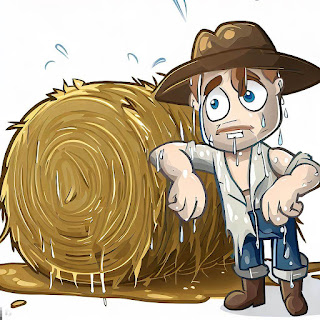
Bing AI image
Being a farmer is weather dependent, and with climate change, it's scary. We have no way to gauge what is going on, really, because the weather isn't like it used to be. The fronts are coming in from strange directions. We have smoke-filled skies from Canadian fires, so smoky that we can't even see the clouds to judge if they're up there or not. Sometimes it's so hazy it's like the sun has been veiled.
All we can do is roll with it, and hope that this second cutting of hay perks up with the rain, and we get more than we lost on the 5 acres that is now too wet to bale.
Monday, July 17, 2023
A Catch-Up Post
Monday, July 03, 2023
Wineberries
 |
| I have always liked how the berry/flower leaves a star shape after the berry's been picked. |
 |
| This about the extent of our wineberry patch. |
Friday, April 07, 2023
When I Cry for the Cow
Early yesterday morning, just at daybreak and before we were out and about, one of our cows gave birth to a little bull calf.
Watching, unbeknownst to us, were a flock of vultures.
My husband first saw the vultures when he went to feed, and then he found the calf.
The vultures had killed it. It was still warm when my husband picked up the little body to bury it. That's how we know the calf was born yesterday morning. Had it been born earlier, it wouldn't have been warm.
The ground all around the calf was stomped down and trampled. The cow, having just given birth, was then forced to try to defend her baby, and she ran around and around him, trying in vain to keep a flock of vultures from eating her child.
I imagine she finally could fight no longer, and the birds swarmed in.
The thought of it makes me cry. Cows are very good mothers, incredibly protective and nurturing.
We are what may be called a "natural" farm. We don't use artificial insemination, nor do we keep the bull from the cows and try to time the births so that they all fall in April or some other time. We let nature do her thing. Generally, the cows have calves in the spring and fall, but some are off cycle. We let the bull do his thing when the cows are ready, whenever that is. A cow gestation is about 280-285 days, so they only give birth once a year, but they do not all give birth at the same time.
Baby calves are not born walking. It takes them a bit to find the strength to stand up, though they are up on all fours usually within 15 minutes or so. Then they take a drink from their mother, maybe wobble around a while, and rest some more. Being born is hard work. So, there is down time when the calf is vulnerable to predators like vultures and coyotes. Once the calf is stronger, the mother cow takes her baby and hides the bull or heifer in what she considers to be a safe place.
The cattle are checked every day, and this is not the first calf we've lost to vultures (I think it's the second), but it's the first we've lost when we haven't been there to make an effort to stop it. The first time we arrived just a little too late. Other times, we have shown up just in the nick of time.
It makes for a tense stand-off, us trying to stay far enough from a mad momma cow that she doesn't come after us, while keeping the vultures away.
Vultures are a protected migratory species, which means we can't do anything to them except try to scare them and make the farm unwelcoming. This morning my husband drove to where the vultures were roosting in the rain. They didn't like his presence, so they flew away. He will do this now every time he sees them, so that they don't hang around.
Last night, I could not fall asleep for thinking about that poor cow. We are watching her now; we have to make sure she doesn't develop mastitis from not having the calf around to remove her milk. They also grieve for their babies when they lose them. My husband says I imagine that, but I don't think so. I think it makes them very sad indeed. So, I feel very badly for this poor cow. Mostly, I am frustrated that it happened on the other side of the farm, where we couldn't hear the noise, and had no idea this was going on until it was too late.
I am very sorry that we failed our cow, but we can't be everywhere at once.
You learn a lot of stuff about life on a farm.
Sometimes you even cry for the cows.
Wednesday, October 26, 2022
Tuesday, July 19, 2022
Wineberries
When I was a young girl, about this time of year we'd go wineberry picking.
Wineberries are an invasive species that are also good to eat. The berries are sweeter than a raspberry, though smaller, and animals love them.
We loved them too, and they were difficult to find. Since my father actively farmed, he did his best to keep things like wineberries from taking over fields. We found them on the edges of fields near forests, in gullies, and other places the mowing machine and herbicide sprayers couldn't reach.
Usually, we only found a few handfuls and ate them then and there, hot off the cane, juice running down our faces.
Fast forward to adulthood, and I found a few wineberry bushes on my husband's family farm, but not many. Not enough for even a handful, really.
This year, my brother shared that my father's property, which is no longer farmed but instead used to attract deer and other wildlife, was loaded with wineberries and blackberries.
He made pints and pints of wineberry jelly. He loves to cook and apparently likes to make jelly, too! He also generously brought me a big container full of wineberries simply for eating.
 |
| All mine just for eating! Yum. |
 |
| This is a wineberry plant. The stalks have little hairs on them. |
 |
| This is what a plant looks like after the wineberry has been picked or fallen off. |
 |
| A close-up of the little hairs on the wineberry cane. |
 |
| My brother's wineberry jelly, one with seeds, one without. |
Wineberries (Rubus phoenicolasius) are considered an invasive shrub in the same genus as raspberries and blackberries. The berry canes create thickets that reduce an area’s value for wildlife habitat and recreation.
Wineberries were introduced to North America in the 1890s as breeding stock for raspberries. They originated in Japan and eastern Asia.
By the 1970s it was invading natural areas, although it must have spread fast because my grandfather, who grew up in Botetourt in the early 1920s or thereabouts, had them growing on his farm by then because he told us what they were when we were children, and that was in the 1970s.
They may be invasive, but animals love them and depend on them now for food. And they sure make a nice afternoon snack!
Wednesday, October 13, 2021
Loopy for Luffa
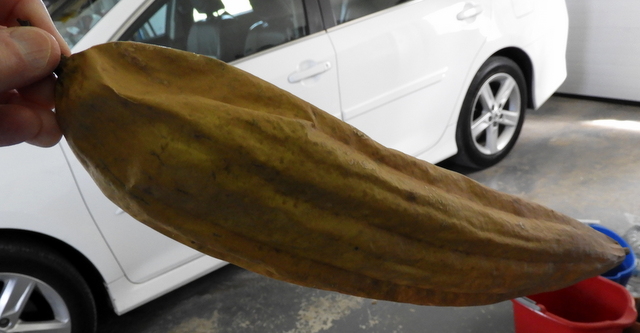 |
| This is the luffa fruit (?) from which a loofa is made. |
 |
| First one must chop the end off. |
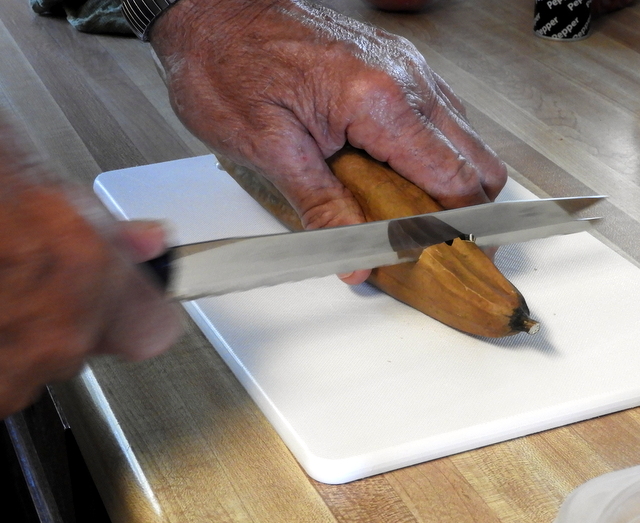 |
| The other shell is quite hard and crusty. |
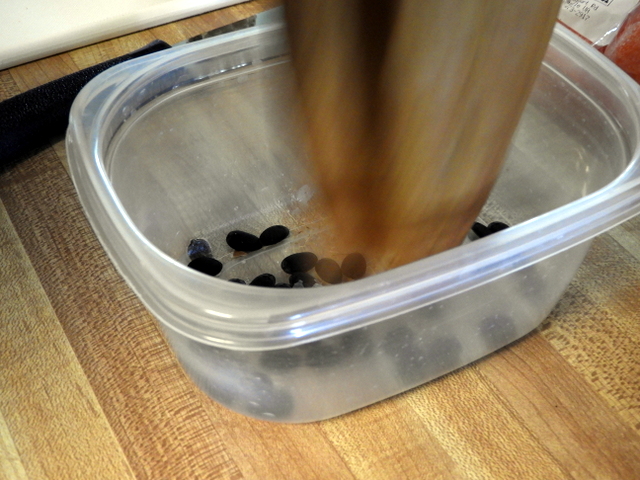 |
| Then dump the seeds into something (to save for next year). There were lots of seeds. |
 |
| Cut off the other end. |
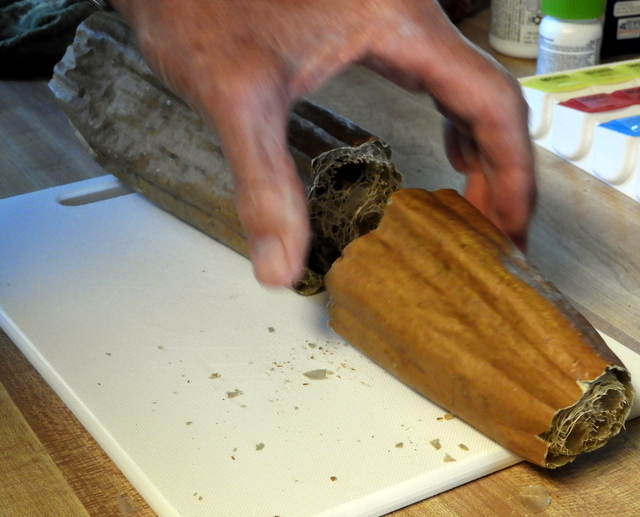 |
| Cut the luffa. |
 |
| That's what it looks like on the inside, with seeds still attached. |
 |
| Peel the outer crust. |
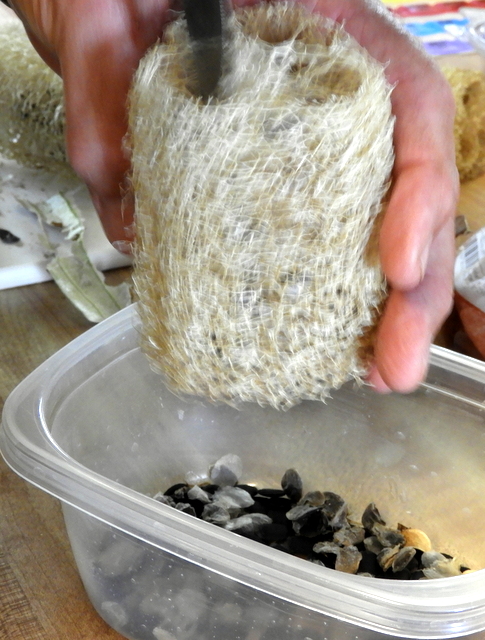 |
| Remove more seeds |
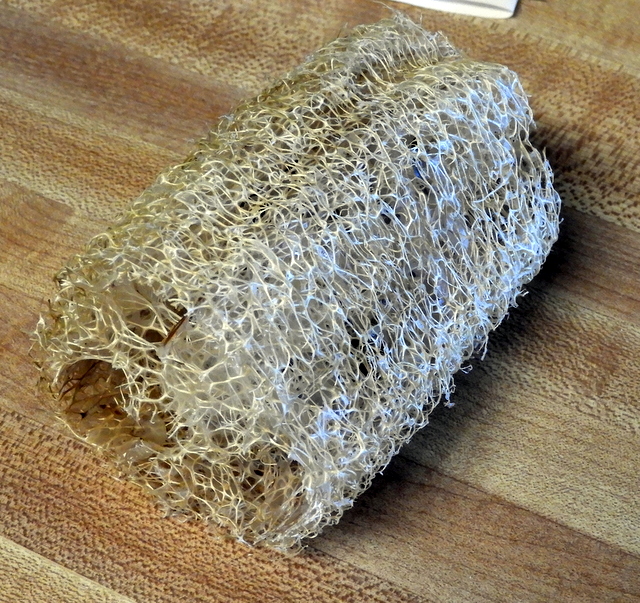 |
| After the seeds have been removed, soak in a mild bleach water. |
 |
| We made three loofas from that one husk. (Pocket knife for size) |
 |
| Here they are, all ready for use. |
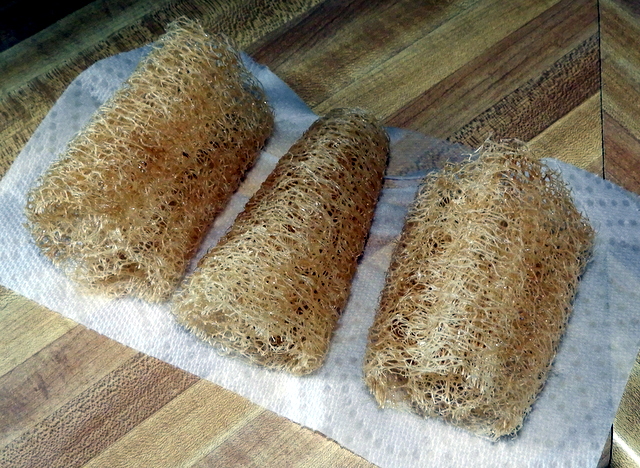 |
| They are a little browner than some in the store. Maybe more bleach? |
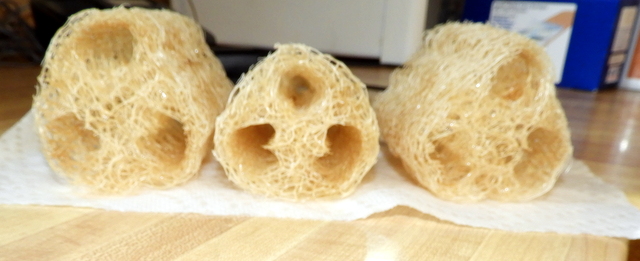 |
| Finished product. |




















